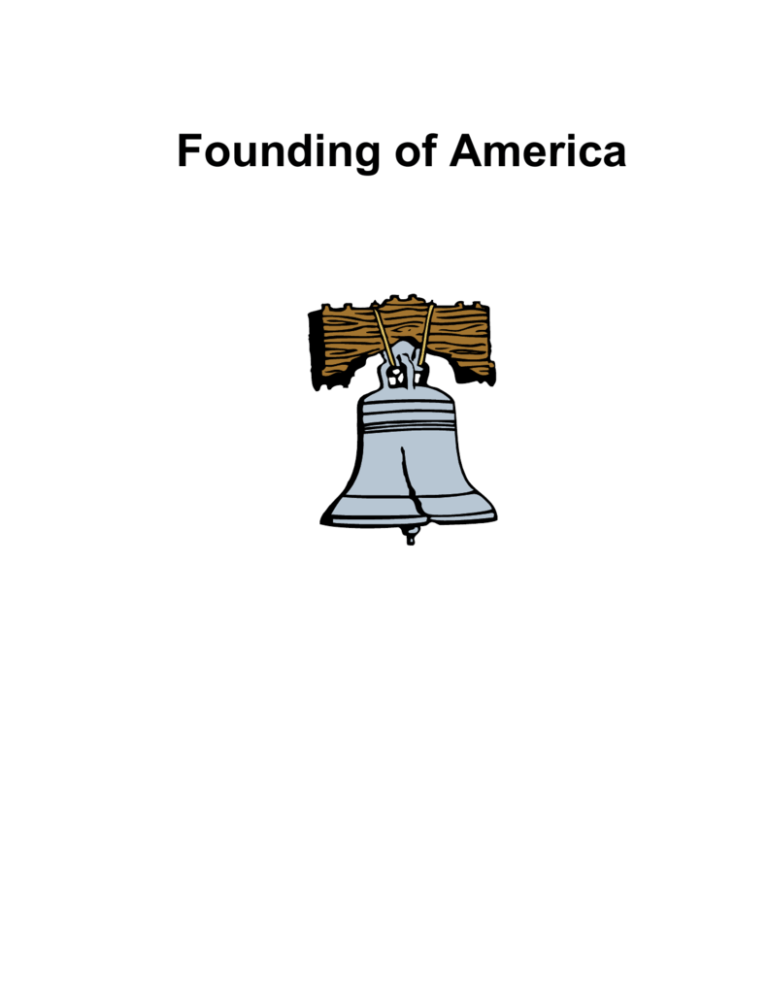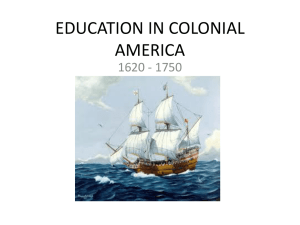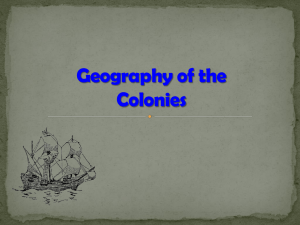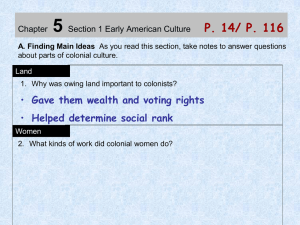Founding of America
advertisement

Founding of America Map of the War Timeline Map of Colonies Founding of America Settlement of America Colonial Political Experience The American Colonial Period The European Tradition Causes of the Revolution The American Revolution I. Map of American Colonial Situation II. Map of American Revolutionary War Saratoga Ft. Ticonderoga Lexington and Concord Valley Forge Trenton Vincennes Yorktown Cowpens III. Timeline of the Founding of America A Bill of Rights is created in England 1689 English establish Jamestown colony 1607 1600 Lexington and Concord 1775 1620 Pilgrims establish Plymouth Colony 1620 1640 1660 1680 Declaration of Independence 1776 1700 1720 1740 1760 French and Indian War starts 1754 1780 British surrender 1781 Articles of Confederati on approved 1781 1800 IV. American Colonial Period Settling America The Native Americans Relations with European Settlers: - Relations with Europeans varied from place to place – sometimes coexisting and sometimes in conflict - Differing cultural values led to many conflicts Trade: - Europeans depended on trade with Native peoples for survival initially - Some native tribes, such as the Iroquois, came to dominate areas of trade with the Europeans Alliances -various alliances between native people and European powers existed, failed, and became created again and again over time - Iroquois alliances helped them dominate the fur trade in the northeast - The Powhatan Confederacy influenced the initial survival of the Jamestown Colony Warfare: - Early fighting lessoned the threat of the Powhatan Confederacy in the Virginia area - King Philip’s War: New England tribes fought against growing European expansion o French and Indian War: - Between France and England (French and Native Americans against the English colonist) - In Europe (called the Seven Years War there) and America - Fought for control of the Ohio River Valley area mostly Africans Free Blacks: - early Africans were considered “indentured servants” – freed when their contract ended Enslaved Blacks - Large plantation farms in the south required many workers - Africans were brought to work on these farms as enslaved workers - smaller farms and a more diverse economy required less slaves in the northern colonies The Europeans - many different European cultures were represented in the colonies - the English dominated though, and came to influence the development of the 13 different colonies the most of any of the European peoples - They came for religious, economic, and political reasons The Colonial Political Experience Experiments of Democracy: Mayflower Compact: - 1620 – Pilgrims signed contract before landing at Plymouth to consent to be governed by a body that they created themselves - this established the precedent of self-government in the colonies Virginia House of Burgesses: - prototype for colonial legislative bodies – based on the two-house system similar to the English Parliament - This further established the tradition of republican government in America Northeast Town Meetings: - In New England – the “Town” was the local center of government - Citizens would hold “Town Meetings” and vote directly on issues Albany Plan of Union: - representatives from the colonies gathered to create a common “union” governmental body - initially designed to help protect the colonies against the French - was a plan to share governmental responsibilities between the colonies on a central level - was rejected by the colonies because the feared losing local control - became a model for later centralized governmental ideas such as the US Constitution John Peter Zenger – Freedom of the press - Zenger was arrested for accusing the governor of NY of doing things he want supposed to be doing - his lawyer argued that it was a crime – if what he printed was accurate - the jury freed Zenger – establishing the case of freedom of the press V. The American Revolution European Democratic Traditions Much of what later became a part of the American experience of democracy, came from ideas and events that took place in Europe before and during the American Colonial Period Events Magna Carta - document signed in 1215 – limited the powers of the monarchy for the first time English Bill of Rights - Late 1600’s – England – established representative government in England and the idea that the “rule of law” was more important than the powers of a monarch Enlightenment Connection: the ideas of these political thinkers greatly influenced American politics John Locke - people have certain rights (life-liberty-property) - if the government fails to protect people’s rights – people can overthrow that government Barron de Montesquieu: - separation of powers was a good idea (Legislative – Judicial – Executive) Jean Jacques Rousseau: - “Social Contract” – people can choose their government – but must agree to follow its rules - the idea that the “majority rules” Causes of the Revolutionary War 1. Mercantilism: - the idea that colonies exist to support the economy of the “Mother Country” - the colonies were used to provide raw materials and markets for English goods 2. Salutary Neglect: - the British government did not pay much attention to the day-to-day political activities of the colonists, allowing them to rule themselves as they saw fit - was seen as both a negative (the British didn’t care about them) and a positive (the colonists learned how to do things on their own) 3. Proclamation of 1763: - British rule that prohibited colonists from moving west into lands won from France after the French and Indian War 4. Taxation Issues: several new taxes caused increasing resentment in the colonies British Act Colonial Response Sugar Act: tax on imported sugar - smuggling, reduced consumption Stamp Act: tax on all written documents, newspapers, letters, legal papers, playing cards - boycott of products, Stamp Act Congress Townsend Acts: variety of taxes (lead, glass, tea) Provides for the firs search warrants against colonists - continued boycott of products Tea Act: tax on non-British Tea - gave a monopoly to the British East India Company for sale of tea in colonies - Boston Tea Party Intolerable Acts: Response to Boston Tea party, closure of Boston Harbor, Suspension of self-government (New England town meeting) Also called the “Coercive Acts” - continued protests, prelude to war 5. Natural Rights: the basic tenants of the Enlightenment caused the colonists to eventually decide to make a political break from Great Britain Common Sense: - written by Thomas Paine - appealed to rational thought - propaganda for action by the common man in the colonies - increased support for the fight for independence Declaration of Independence - Delegates from all colonies met in Philadelphia in June, 1776 - This document stated the colonies’ intention to declare their independence from Britain, and then gave the reasons why they did so - Agreed to by the representatives on July 4th – marking the beginning of the United States of America - written by Thomas Jefferson - most of the document was based on the ideas of the Enlightenment (natural rights, consent of the governed, etc.) VI. Essential Questions 1. In what ways, was the social make-up of the colonies in America significantly different from the culture in Great Britain? Though dominated by the English culture, the colonists were also made up of Scottish, Irish, German, Dutch, French, and many other European cultures The experiences and relationships the colonists had with the Native Americans was significantly different than anything Europeans ever dealt with. The reliance on Africans for labor, created a unique economic environment in the colonies, in addition to the social and cultural effects on the community 2. In what ways did aspects of European culture contribute to a desire by colonists to claim their independence? The documents of the Magna Carta and English Bill of Rights had established a tradition of questioning and limiting the powers of a monarchy The ideas of the European Enlightenment thinkers greatly influenced the minds of the colonists and the creators of the new political system in the Americas 3. What part of the colonial experience in America helped colonists feel confident in both their ability and right to declare their independence from Great Britain? The mixing of different cultures created a new culture that was not entirely similar to the “home culture” – a feeling of cultural independence existed The effects of “salutatory neglect” gave colonist motivation and confidence to establish a government that would look after their own interests









